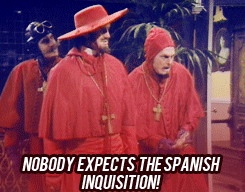The First 4 Abstract Domains
Recently, I saw this clip by Sabine Hosenfelder
Long story short, she explains how Academia has failed, because most of the activity that goes on in Academia is to copy previous research papers and publish the same content again and again.
I can't say I'm surprised. I'm not in Academia, but even in college, I saw how we were supposed to buy books written by our college teachers. Every few years, they'd do a rehash of the old and publish new books with old text.
Now I can make a long and boring clip about that but I think it's about time for…
The Spanish Inquisition !
What I propose we do instead, in the spirit of new science and new ideas in the Academia, is this: let's play a game.
Now, this won't be just a silly nonsense game, as I do think that it contains true and yet unexplored science. At the same time, I think it's best to present it as a game, as I really want to remove any entry barriers like academia has. Plus, I've simplified it so much that I think that at least the basic levels can also be explained to a 4-year-old.
This game will contain a central story, told in many episodes. Imagine we are all gathered in the evening around the campfire. I tell the story and then various people from various teams act on the story and build upon it according to the team's role.
For this episode, let's create 4 teams:
- the constructors should build claims that try to validate and uphold the central story
- the destructors should try to build claims that disprove the central story
- the observers should review claims from either team and note how sound those claims are, what proportion they are based on feeling and what proportion they are based on fact. Observers can also add links to answers if a question repeats itself.
- the public can vote on each claim and decide if it fits well with the story, even if it's for or against the story itself
This will build something like a community-driven story. Pros and cons are lovely twists and turns. Trolling and chaos will be banned. Endless repetition in a bubble, will be left to it's own bubble.
Every person seeing this can play any team and even multiple teams. For objectivity's sake, however, I recommend observers stick to observing and moderating.
When, where, and with whom should you play this game ? Anytime, everywhere and with whomever ! Links below the clip.
Now, the main story is this:
Everything that exists goes through or interacts with something that I call Abstract Domains.
Domain 1: Abstract Domain of Existence
For example, think of a pink elephant. Is it a small elephant or a big one ? How many legs does it have ? What is it doing ?
Does this elephant exist ? Then how can you describe it ? I would say that this elephant exists, at least in your mind, even if it isn't real.
Before you go to the fridge to get something to eat, you either willingly think about it, or you are hungry and your body forces you to think about it. You can do it even as an unconscious behaviour, without consciously thinking about it at all. But that action itself exists in an abstract form before it is realized, regardless of how it is REALized.
A confusion could be made between Existence and Reality, but in Abstract Mechanics the difference is this:
If something can manifest any interaction with something else, then it exists. Aka, it interacts with the Abstract Domain of Existence. But it means that this can happen even in your imagination, like a pink elephant going to talk to Red Riding Hood.
For something to also be real, it has to be MATERIALized or Incorporated. For example, if you draw the pink elephant that you thought of before, then it not only exists, but it is also real. It is now REALized, on a material, from a material. You can carve it on a piece of wood and then the missing wood that represents the carving is still a real-ized elephant.
Domain 2: Abstract Domain of Mass
Anything that exists, real or not (!), that can be thought of as a fixed quantity, interacts with the Abstract Domain of Mass.
The finished drawing of a pink elephant can become just something you forget in a drawer and you never work upon it to change it anymore. That is a mass object.
A Pink Elephant cathedral, like a second Sagrada Familia, that many generations work upon, is way more than a mass object. It will have mass, but it will also have stories, effort, body and soul put into it. It will be part of memories and the life of generations of builders. It's interaction with the Abstract Domain of Mass is insignificant in comparison to the rest of it's interactions.
You can also have a huge mechatronic state-of-the art Pink Elephant Robot that one day breaks down. You're too lazy to fix it and yet you don't want to tear it apart just yet. Before you noticed, years went by and you used that huge mechatronic Pink Elephant just to park your car under it. You have used it as a mass object. Or, better said, you have used merely one of it's many potential features, the feature of it having a mass of some material, almost any material, placed in a certain position.
Objects from the mass domain are the cheapest things that are real when reasonably compared with items of the same type, material, function, etc. For example, a broken mechatronic pink elephant, used for years as a makeshift shed to park a car under, is definitely less valuable than the same mechatronic elephant in perfect working condition, which can be used for more than just shelter from the weather.
Domain 3: Abstract Domain of Transformation
Transformation is a tricky domain because it can mean a lot of things. And in fact, each new Abstract Domain will greatly complicate things. Sometimes I perceive the Abstract Domain of Transformation as being fused with Existence and another one that I will mention in later episodes, but it can also function very well on it's own.
Also, at this point, it's good to just quickly mention that there are paths through the Abstract Domains. Things can move forward or backward.
Something that Exists or that is Real can interact with the Abstract Domain of Transformation, and if it moves on a forward path, it will also increasingly interact with the Abstract Domain of Design. On a backward path, less design.
A stick figure of an elephant is less designed than the Rembrandt level of a pink elephant painting. The less something interacts with the Abstract Domain of Transformation, the more likely it is to fall back to the Abstract Domain of Mass.
Domain 4: Abstract Domain of Design
Design is really simple to understand. Just a stick figure elephant on a piece of paper and already that piece of paper has a higher level of interaction with the Abstract Domain of Design. You can even fold the paper and already it's Design has increased. Things can also interact less with Design. For example, let's say that you finally decide to strip everything from the Mechatronic Elephant and leave just its bare, empty case. (If you had a negative reaction imagining that, it's because you yourself interact more with the Abstract Domain of Design.). A stripped down mechatronic pink elephant is less designed than a fully working one, or a broken one but still contains all the required electronics and mechanics that give it the potential to make it work,
Now, that is the core story of the game.
Recap: Things can Exist, be a Mass of something, more or less Transform and increase or decrease in Design.
How to play this game and contribute to evolving the story is this:
- go over the rules again
- write a comment, preferably on Kialo Edu. I will definitely prioritise that place over anything else.
- if for some reason, you don't want that, you can also write on Facebook and Youtube
- If you want to spread the game, you can repost the clips, add your claims in the post, and engage with the ones that comment on your post
- I will also post this clip on the usual networks, from Twitter to TikTok, but due to my very limited time, I will not be able to respond everywhere. I won't be responding on my own site either.
The model of perceiving and explaining the Universe and Existence based on Abstract Domains is called "Abstract Mechanics".
Observed by events from the life of myself, Zoran D. Marincov.
Systematized in decades that passed and hopefully decades to come. Hopefully constructively contributed by anyone who wants to.
I will only be able to answer in these places:
- Youtube (I will update the link after I post a clip about it)
- Facebook: https://www.facebook.com/AbstractMech


